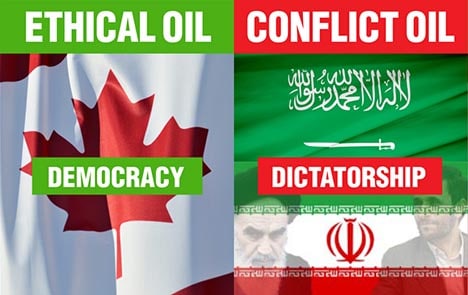The controversial Ethical Oil ads, which enjoyed an exclusive run on the Oprah Winfrey Network at the end of August, have earned a new enemy: the Kingdom of Saudi Arabia.
The tar sands industry ad campaign, which criticizes our reliance on oil imports from Saudi Arabia due to its poor human rights record, tells viewers that choosing between women’s rights and tar sands expansion is “a choice we must make”.
The ads argue instead that intensifying tar sands production will actually help liberate women from oppressive petrocracies like Saudi Arabia. They also imply that we must support the controversial Keystone XL pipeline because it will decrease our reliance on “conflict oil”.
According to the ads, “We bankrolled a state that doesn’t allow women to drive, doesn’t allow them to leave their homes or work without their male guardian’s permission and a state where a woman’s testimony only accounts for half of a man’s”.
A female voice pleads to the viewer, “Why are we paying their bills and funding their oppression?”
The ad has angered Saudi Arabia, who in response sent a cease and desist letter to Telecaster Services from the Television Bureau of Canada, demanding approval for the ads be withdrawn.
Ethicaloil.org is now using the cease and desist letter as a public relations stunt. According to the industry group’s spokesman, former Tory communications director Alykhan Velshi, “We caught this foreign dictatorship trying to undermine freedom of the press here in Canada and trying to export its own contempt for democracy, its own contempt for freedom of the press here in Canada”.
Velshi has even used the plea to get the ad on Canadian television. As of Monday, Sun Media (A.K.A. Fox News North) will air the ads on its network. Ethical oil cheerleader and Conservative operative Ezra Levant is an anchor for the network and the registrant of the ethicaloil.org website.
Velshi has also alerted Foreign Minister John Baird (whom Velshi worked for as a Director of Parliamentary Affairs) and Dean Allison of the House of Commons Standing Committee on Foreign Affairs and International Trade about the incident, calling for an investigation into a “foreign dictatorship trying to censor what Canadians can and cannot see on their televisions”.
Levant and Velshi have used the lawsuit to shore support for their ads, which are at their very core misleading. Yes, Saudi Arabia abuses women’s rights. But the link that the ads are trying to force — that expanding tar sands production will somehow liberate Saudi women — does not hold up to scrutiny. The ads present incorrect information & use alarmism to catch people in a false choice.
As I wrote earlier, tar sands expansion won’t hurt Saudi oil imports: the Keystone XL pipeline was created to keep Gulf coast refineries at capacity, not to reduce reliance on foreign oil. The United States and Canada combined hold less than 5 percent of the world’s proven oil reserves, so increasing output from the tar sands won’t substantially decrease our reliance on foreign oil, and it won’t reduce the world’s demand for Saudi Arabia’s crude.
These diversionary tactics are, however, distracting us from having the long-overdue conversation about the environmental and human impact of tar sands expansion on downstream and First Nations communities, and about the need to rapidly pursue a clean energy future.
If the goal here really is to hurt Saudi sheiks for their treatment of women, we should support a transition from dirty fossil fuels to renewable energy.
But instead we see a circus act by Velshi, who has challenged the Saudi ambassador to a debate – “moderated by a woman” – to settle, “which one is the bigger asshat”.
Who’s your money on?
Subscribe to our newsletter
Stay up to date with DeSmog news and alerts







